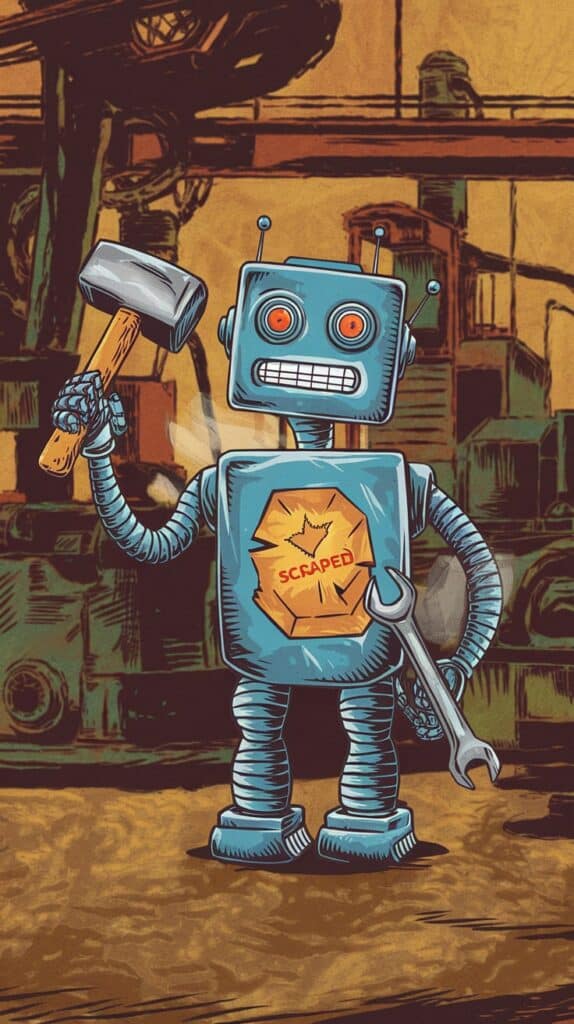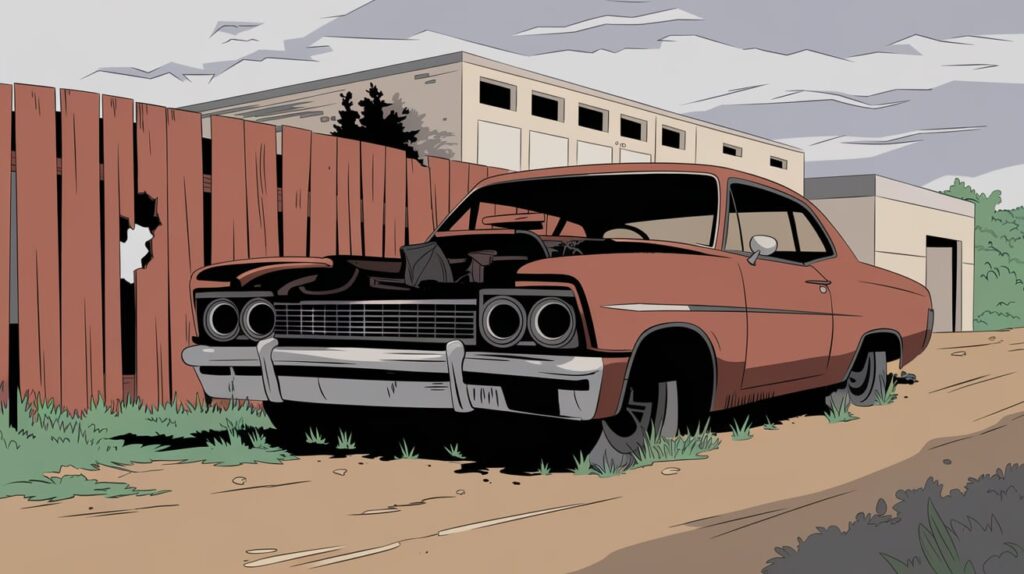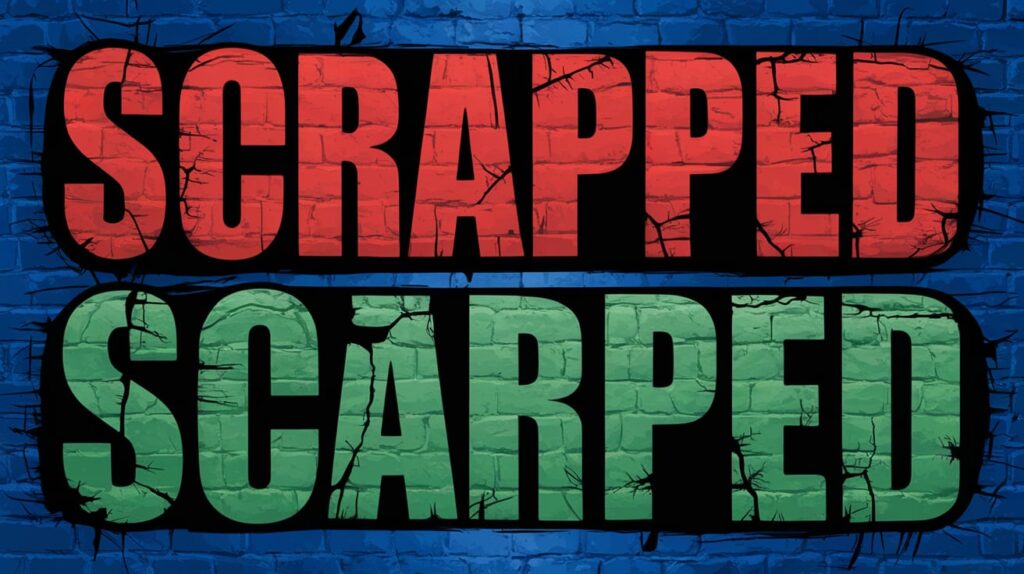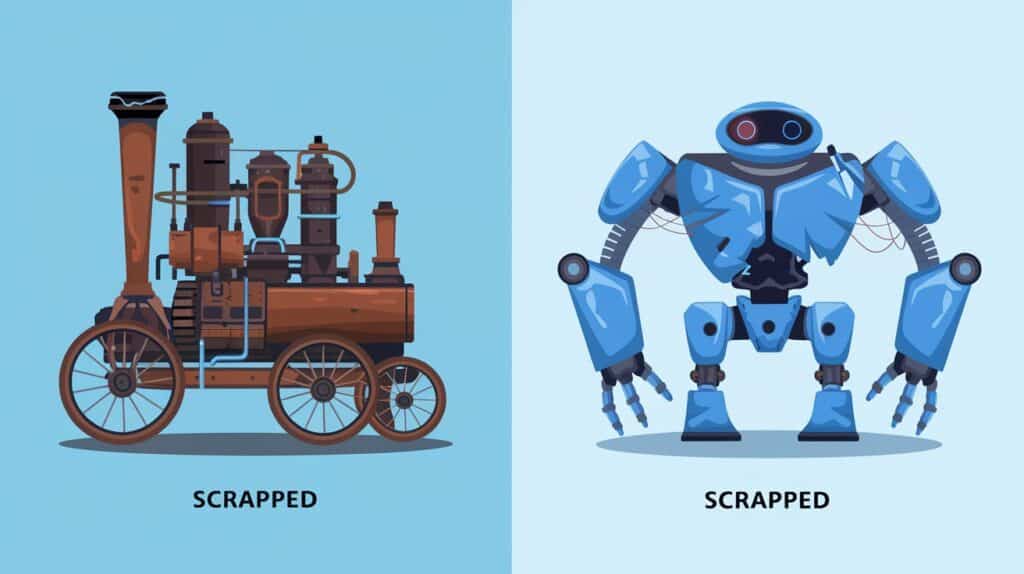Language can be tricky, especially when words sound similar but mean very different things. One of the most common confusions? Scrapped vs Scraped. Many writers, students, and even professionals mix them up, leading to awkward sentences and miscommunication.
In this ultimate 2026 guide, we’ll break down the meanings, uses, and differences of scrapped and scraped, with clear examples, synonyms, and tips to avoid mistakes. By the end, you’ll never confuse these words again and your writing will be sharper than ever.

Why is There Confusion?
The confusion between scrapped and scraped arises mainly from their phonetic similarities. Both words stem from different roots and have specific contexts in which they are used.
While they may seem interchangeable, knowing the right term can enhance clarity in your communication. Understanding their usage can help you avoid embarrassing mistakes and convey your message effectively.
Read more : Wife’s or Wives: Possessives – Grammar Beacon
The Importance of Precision in Language
Language is a powerful tool, and using it accurately helps you connect with your audience. When you choose the right words, you can paint a clearer picture and reduce misunderstandings.
Misusing words like scrapped and scraped can lead to confusion and misinterpretation. This highlights the importance of knowing the precise meaning of the terms you use in your writing and speaking.

What Does the Word “Scrapped” Mean?
When something is scrapped, it means that it has been discarded, abandoned, or canceled. Often, this term refers to plans, projects, or materials that are no longer needed or viable.
For instance, a company might scrap a project if it’s not financially feasible.
In a Business Context
In the business world, the term scrapped frequently appears in discussions about product development, project management, or strategic planning. Companies may decide to scrap a product that doesn’t meet market demands or fails to generate enough interest.

Example: A tech startup might invest time and resources into developing a new app. However, after conducting market research, they realize that the app won’t attract users.
Consequently, they decide to scrap the entire project to focus on more promising opportunities.
Read more : Student’s, Students’, or Students? – Grammar Beacon
Personal Projects
Individuals can also scrap plans when circumstances change. Life can be unpredictable, leading to decisions that necessitate abandoning previous intentions.
Example: Imagine you’ve planned a vacation for months, but then an unexpected work commitment arises. In this scenario, you might find yourself having to scrap those travel plans altogether.

Related Expressions
Scrap heap: This phrase refers to discarded materials or things that are no longer useful.
Scrap metal: Refers to metal that has been discarded and is often recycled.
What Does the Word “Scraped” Mean?
On the other hand, scraped refers to the action of removing a layer or surface from something, usually with a tool or by friction. This term can also imply collecting or gathering items in a rough manner.
Read more : Story’s or Stories possessives – Grammar Beacon
Cleaning and Maintenance
In daily life, you might find yourself scraping surfaces to clean or prepare them for further use. This action can take place in various contexts, from kitchens to art studios.
Example: After cooking, you might scrape the remnants of food off a pan before washing it. This simple act of cleaning can prevent residue from hardening and make the washing process easier.

Artistic Uses
Artists often scrape paint from canvases to achieve specific effects or to correct mistakes. The technique can be essential for creating texture or revealing underlying layers.
Example: An artist might apply a layer of paint, then scrape it off partially to expose the color beneath, creating a visually intriguing piece.
Read more : Cacoon vs Cocoon Spelling – Grammar Beacon
Related Expressions
Scraped together: This phrase can imply collecting various items or resources, often in a hurried or unrefined manner.
Scrape by: Means to manage to get by or survive, usually with difficulty.
“Scrapped” vs. “Scraped”: Differences
Understanding the differences between scrapped vs scraped is crucial for using them correctly.
Read more : Other Ways to Say Thank You for Your Attention – Grammar Beacon
Definitions Summarized
Scrapped: Refers to something being discarded or abandoned. It often relates to projects, ideas, or materials that no longer serve a purpose.
Scraped: Involves physically removing something from a surface. This action often requires a tool or some degree of effort.

Visualizing the Differences
To further clarify the distinction, consider these scenarios:
Scrapped: Imagine a business deciding to scrap an entire marketing campaign because it wasn’t yielding the desired results. The campaign materials are thrown away, and the effort is deemed wasted.
Scraped: Picture a painter who has just finished a mural. To clean the brushes, they scrape off excess paint, ensuring the tools are ready for future use.
Read more : Other Ways to Say Thank You For Responding Quickly – Grammar Beacon
Which One Should You Use: “Scrapped or Scraped”?
To determine whether to use scrapped or scraped, consider the context of your sentence. Are you talking about abandoning an idea or project? Use scrapped. Are you discussing the act of removing something? Then, scraped is the word you need.
Contextual Clues
Look for clues in your sentence to guide your choice. If the subject relates to cancellation, abandonment, or discarding, opt for scrapped. If it relates to removal or cleaning, choose scraped.
Examples in Context
Examples of Scrapped
The Film Project: The director scrapped the film project after realizing it wouldn’t resonate with audiences.
The Initiative: The school scrapped its after-school program due to budget cuts.
Examples of Scraped
The Car Windshield: I scraped the frost off my car windshield to see clearly while driving.
The Wallpaper: During the renovation, we scraped off the old wallpaper to prepare for a new design.

Read more : “Totalling” vs. “Totaling”: Navigating the Spelling Dilemma – Grammar Beacon
Synonyms and Similar Terms to “Scrapped” and “Scraped”
Understanding synonyms can help clarify the meanings further. Exploring related terms can expand your vocabulary and improve your precision in communication.
Synonyms for Scrapped
- Abandoned: To leave behind or give up.
- Discarded: To throw away or dispose of.
- Canceled: To annul or call off.
- Dismissed: To reject or refuse to consider.
- Terminated: To bring to an end.
Synonyms for Scraped
- Removed: To take something away or off.
- Raked: To gather or collect.
- Cleared: To make free of items or obstacles.
- Stripped: To remove all coverings or layers.
- Shaved: To cut off or remove very thin layers.
Origins of “Scrapped” and “Scraped”
Understanding the origins of words can provide insight into their meanings and help you remember their usage.

Origins of “Scrapped”
The word scrapped comes from the noun “scrap,” which historically referred to a small piece or fragment. The verb form emerged in the 19th century, indicating the action of discarding such fragments.
The evolution of this word reflects the common practice of getting rid of what is no longer necessary.
Origins of “Scraped”
Scraped originates from the Old French word “escraper,” which means to scratch or rub off. This term dates back to the 14th century and emphasizes the physical action of removing a surface layer.
The evolution of scraped highlights the importance of manual effort in achieving a desired result.
Practical Applications: Scrapped vs. Scraped in Everyday Life
In Business
Understanding when to scrap an idea can save resources and time. Companies must often evaluate projects to determine their viability.
Example: A tech firm may invest significant resources into a new software project. If early tests indicate a lack of user interest, the team may decide to scrap it entirely and pivot to a different initiative.
In Home Improvement
When renovating, you might find yourself needing to scrape old paint or wallpaper off walls. This preparation is crucial for ensuring that new layers adhere properly.
Example: Before applying a fresh coat of paint, it’s essential to scrape away any peeling or flaking areas to achieve a smooth finish.
In Daily Routines
In daily life, both terms can apply to mundane tasks, making them relatable.
Example of Scrapped: If you had plans to cook a complicated meal but decide to scrap them for a quick salad instead, you’ve made a practical choice.
Example of Scraped: After a winter storm, you may need to scrape the ice off your driveway to ensure safe passage.
The Impact of Misusing Scrapped and Scraped
Using the wrong term can lead to misunderstandings or miscommunication. When you say something was scraped when it should have been scrapped, you alter the meaning entirely. This can confuse your audience and detract from your message.
Real-Life Consequences
In a business context, for instance, miscommunication can lead to poor decision-making. If a team member reports that a project was scraped, it may imply that the project is still in progress.
Conversely, saying it was scrapped makes it clear that the project has been abandoned.
Enhancing Your Vocabulary with Contextual Learning
To master the usage of scrapped and scraped, consider incorporating them into your daily vocabulary. Reading, writing, and engaging in conversations can reinforce your understanding.

Practice with Examples
Write sentences: Create your own sentences using both terms. This practice will help solidify your grasp on their meanings.
Engage in discussions: Discuss projects or cleaning tasks with friends or colleagues, using scrapped and scraped appropriately.
Expand Beyond Scrapped and Scraped
Learning about other commonly confused words can also enhance your vocabulary. Consider exploring terms like complement vs. compliment, or affect vs. effect. Understanding these differences will elevate your language skills.
Conclusion
Understanding the nuances between scrapped vs scraped can significantly improve your communication skills. By recognizing the meanings and contexts of these words, you can avoid common mistakes and enhance your writing.
Remember, when you need to describe something that has been abandoned, use scrapped. But if you’re referring to the action of removing something, go with scraped.
Next time you find yourself pondering, “Is it scrapped or scraped? Let’s clarify the confusion,” you’ll know exactly how to respond! With these insights, you’re better equipped to navigate the English language with confidence.
By taking the time to explore these terms in-depth, you’ve not only clarified your understanding of scrapped and scraped but also enriched your overall vocabulary. Keep practicing, and soon you’ll find these words flowing naturally into your conversations and writing.
Sure! Here’s a summary table highlighting the key points about “Scrapped” vs. “Scraped.”
| Aspect | Scrapped | Scraped |
| Definition | Discarded, abandoned, or canceled. | Removed or rubbed off a surface. |
| Context of Use | Projects, plans, ideas. | Cleaning, art, physical removal. |
| Example in Business | A company scrapped a failing project. | – |
| Example in Personal Life | I scrapped my vacation plans. | I scraped the ice off my windshield. |
| Synonyms | Abandoned, discarded, canceled, terminated. | Removed, cleared, stripped, shaved. |
| Origins | Derived from “scrap,” meaning a fragment. | From Old French “escraper,” meaning to scratch. |
| Common Confusion | Misused for removal actions. | Misused for cancellation or abandonment. |
| Impact of Misuse | Can lead to misunderstandings in context. | Alters intended meaning. |
This table summarizes the essential differences and applications of scrapped and scraped for quick reference!
FAQs
Is it “scrapped” or “scraped”?
- Answer: Use scrapped when discarding or canceling something. Use scraped when physically removing a layer from a surface.
Can you say “scraped a project”?
- Answer: No, that’s incorrect. You should say “scrapped a project” to indicate cancellation.
What’s the difference between “scrap” and “scrape”?
- Answer: “Scrap” refers to discarding or leftover material. “Scrape” refers to removing or rubbing off a surface.
How can I remember which one to use?
- Answer: Think scrapped = canceled/abandoned, and scraped = removed/cleaned. A mental image often helps: you scrape ice off a windshield, but you scrap a failed project.
Can scrapped be used for personal plans?
- Answer: Yes! For example, “I scrapped my vacation plans due to work.”

James Logan is a seasoned blogger and language enthusiast behind Grammar Beacon. With years of experience in grammar and writing, James shares his expertise through insightful and engaging content. His passion for clear communication and linguistic precision shines in every post, making complex grammar concepts accessible and enjoyable for readers. Follow James for expert advice and tips to refine your writing skills.






